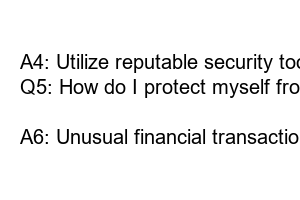개인 정보 유출 확인
Title: Confirm Personal Information Leakage: Prevent Identity Theft and Stay Secure Online
Introduction:
In today’s digital era, privacy breaches and personal information leakage have become a concerning phenomenon. With increasing cyber threats, it is crucial to be aware of the potential risks. In this blog post, we will explore ways to confirm personal information leakage, prevent identity theft, and maintain online security.
1. Understanding the Threat: Why Confirm Personal Information Leakage?
Ensuring the safety of personal information is vital, as cybercriminals constantly devise new methods to steal identities. Confirming personal information leakage allows you to take appropriate measures to protect your privacy and prevent unauthorized access.
2. Keep a Close Eye on Your Financial Statements and Credit Reports:
By regularly reviewing your bank statements, credit card bills, and credit reports, you can identify any suspicious transactions or accounts. **Monitoring your financial activities** helps to detect unauthorized access and take immediate action.
3. Utilizing Data Breach Notifications and Security Tools:
Stay informed about data breaches by subscribing to data breach notification services. Additionally, **using reputable security tools** such as firewalls, antivirus software, and password managers can significantly enhance your online safety.
4. Limit Sharing Personal Information on Social Media:
While social media platforms facilitate easy information sharing, be cautious about what you disclose. Avoid sharing sensitive data, such as your home address or full date of birth, publicly. **Maintain a balance between social presence and personal privacy** by sharing only necessary information.
5. Create Strong and Unique Passwords:
A strong password is the first line of defense against unauthorized access. Ensure your passwords are a combination of uppercase and lowercase letters, numbers, and special characters. **Avoid using common phrases** or easily guessable information, and refrain from reusing passwords across different platforms.
6. Be Cautious of Phishing Attempts:
Phishing scams remain prevalent, with cybercriminals attempting to acquire personal information through fraudulent emails or websites. **Exercise caution** when providing any personal details online and be vigilant about suspicious emails or messages requesting sensitive information.
7. Secure Your Wi-Fi and Personal Devices:
Protect your home network and personal devices by enabling strong encryption, regularly updating device software, and using secure browsing protocols. **Securing your virtual environment** helps prevent information leakage and unauthorized access.
Summary:
Confirming personal information leakage is crucial in maintaining online security and preventing identity theft. By monitoring financial statements, utilizing security tools, limited sharing on social media, creating strong passwords, being cautious of phishing attempts, and securing personal devices, you can enhance your privacy and reduce the risk of information leakage. Stay proactive and vigilant in safeguarding your personal information to stay one step ahead of cyber threats.
———–
FAQs:
Q1: How can I confirm if my personal information has been leaked?
A1: Regularly monitor your financial statements, credit reports, and subscribe to data breach notification services.
Q2: What should I do if I suspect my personal information has been breached?
A2: Act promptly by contacting your financial institutions, changing passwords, and reporting the incident to the appropriate authorities.
Q3: Can using strong passwords make a difference?
A3: Absolutely! Strong passwords act as a strong barrier against unauthorized access and protect your personal information.
Q4: Are there any specific security tools that you recommend?
A4: Utilize reputable security tools such as firewalls, antivirus software, and password managers to enhance your online security.
Q5: How do I protect myself from phishing attempts?
A5: Be cautious when providing personal details online, double-check the sender’s credibility, and avoid clicking on suspicious links or attachments.
Q6: What are some common signs of a possible data breach?
A6: Unusual financial transactions, unfamiliar accounts, or receiving notifications about account changes you didn’t make are red flags to watch out for.

